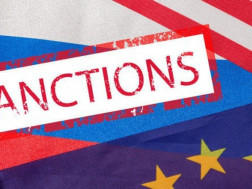In light of significant public interest, the Revenue Service of Georgia has issued a statement regarding a report broadcasted by Sky News on September 24.
“The report, titled “Brand new luxury British and European cars are entering Russia despite being banned – here’s how,” contains vague and unsubstantiated claims that require clarification.
First and foremost, it is important to clarify that the British journalist did not contact the Revenue Service of the Ministry of Finance for an official explanation regarding the enforcement of international sanctions during his visit to Georgia.
Additionally, the Sky News team prepared a report in February of this year without consulting official sources or verifying the facts, prompting an official response from the Revenue Service at that time.
Regarding the material published on September 24, the report fails to specify which country’s statistics it references when claiming an export volume of £26 million, leaving uncertain what official data the author relied upon.
The Sky News journalist asserts that once cars reach the Caucasus, their records vanish from databases, stating that “since expensive cars are transported to individuals across the border, this information is not reflected in the customs data.” However, the report does not clarify which country’s customs data the journalist is referring to.
In the story, the journalist claims that all the luxury cars he snapped are sanctioned, implying that transporting them across the border would constitute sanction evasion.
On this matter, the Revenue Service reiterates that due to the ongoing war in Ukraine, the United States, the United Kingdom, the European Union, and other countries involved in implementing economic sanctions have imposed restrictions on certain goods traded with the Russian Federation and Belarus, including automobiles imported from other countries.
Georgia fully and unequivocally adheres to international sanctions procedures, and there are no contrary facts to report. The Revenue Service, in accordance with customs control regulations concerning the movement of sanctioned goods in Georgian territory, closely collaborates with and maintains constant communication with competent agencies in the United States, the European Union, and other partner countries. They are continuously updated on the enforcement of sanctions.
Since the implementation of international sanctions, Georgia has strictly complied with established rules and diligently monitored all customs operations at its borders.
It is essential to note that the restrictions do not apply to the export or re-export of vehicles imported from the U.S. and the EU to countries not listed in the respective sanctions. However, this exemption does not extend to light vehicles, owned by individuals, that are utilized for personal use and not intended for sale.
Furthermore, unlike other categories of goods, such as advanced technology or high-priority items, the sanctions imposed by these countries do not prohibit the transit of passenger cars to third countries, including transit through the Russian Federation.
Hence, Georgia cannot unilaterally impose restrictions on export, re-export, or transit procedures for goods not subject to sanctions. Thus, there was no basis for restricting the movement of these vehicles.
Moreover, the Customs Department of the Revenue Service, in collaboration with partner agencies, conducts stringent checks on vehicles with transit numbers and maintains meticulous oversight of submitted documentation.
We can state with full confidence that there has been no instance of sanctioned passenger cars from the United Kingdom being transported through Georgia in a transit, export, or re-export capacity destined for the Russian Federation.
Lastly, the claim that the majority of these vehicles lack registration numbers is false. When crossing the customs border, individuals present the vehicle under their control, which bears a temporary number plate issued along with a temporary license valid only within the country.
While the Sky News report stops short of definitively naming Georgia (and its relevant agencies) as a country implicated in sanction evasion, the material has unfortunately been leveraged by various Georgian media outlets to attack their own country and discredit the customs administration,” the agency said in a statement.
















